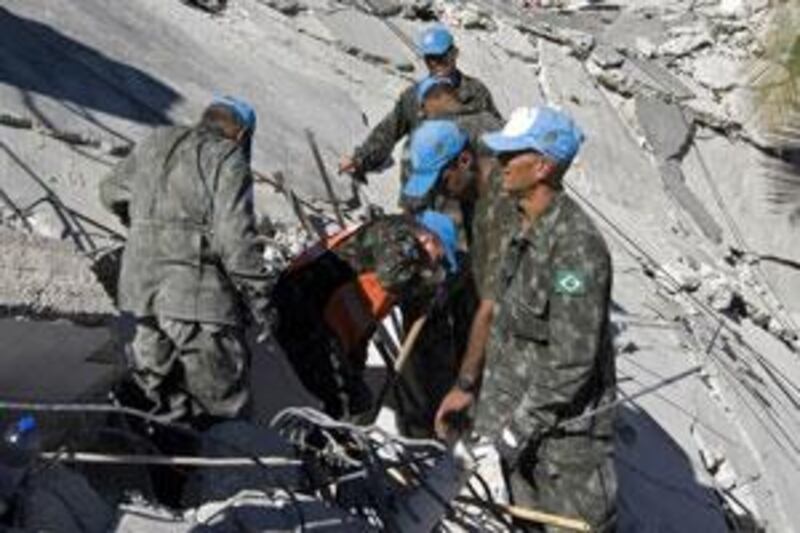NEW YORK // Reports of three UN staff being killed in clashes between the Congolese army and a militia this month have added to the toll in what has already been the deadliest year for the agency's aid workers.
The UN Mission in Congo said that a South African pilot and a UN peacekeeper from Ghana were killed during the two days of clashes in northern Democratic Republic of Congo. One of its subcontractors also died on April 4 of a heart attack during the fighting, according to a report from the Associated Press. Following the Haitian earthquake, which left 150 UN workers dead, this year ranks as the worst for UN casualties in the world body's six-decade history.
This is hardly a new trend and, with 2009 marking yet another annus horribilis for the organisation, continued attacks on employees are deepening a fractious debate over staff security. At the core of the argument is whether the United Nations can provide security for employees in hostile arenas and whether to risk the safety of aid workers who provide food, medicine and other life-saving supplies to beleaguered populations.
Humanitarians around the world were aghast when masked attackers shot dead Ibrahim Hussein Duale, a UN aid worker in his native Somalia, while he made sure that schoolchildren in the southern village of Yubsan received regular food parcels. Duale, 44, a World Food Programme (WFP) officer, was among at least 28 UN civilian staff members killed worldwide last year. After the slaying of Duale in the Gedo region in January 2009, the WFP boss Josette Sheeran paid tribute to a "good, honest man" who left behind a wife and five children while playing his role in a UN mission to feed more than 1.5 million people in a lawless land.
His killer, a member of an armed group, was ordered to compensate Duale's family with 100 female camels after a five-day trial in March 2009 - the ruling of a Sharia court in Bardhubo, a town under the control of the hard-line Islamist group Shabab and its allies. With about one third of Somalia's 10 million people desperately needing food and other supplies, UN bosses were loath to withdraw aid workers from the country, only suspending WFP deliveries to southern Somalia in January. Agency chiefs said attacks on staff were "making it virtually impossible to reach up to up to one million" recipients.
Edoardo Bellando, from the UN Staff Union Committee on the Security and Independence of the International Civil Service, described the dilemma over sacrificing aid-dependent civilians to ensure the security of humanitarian workers as a "problem from hell". "There is always this impossible balance that the UN is trying to strike, between being there and assisting people, and showing the flag and keeping a presence and keeping the impression of normalcy and order, and preserving the lives of its own staff," he said.
While the United Nations was perceived as neutral during the Cold War, the world body has become viewed as an extension of western interests since the 1990s, increasingly being targeted by hard-line Islamists and other extremists in high-profile attacks, including a suicide bomb attack in October 2009 on the fortified WFP office in Islamabad that killed four Pakistani staff. Finbarr Curran, a Dubai-based WFP official, said UN staffers were seldom deterred by gunmen and bomb attacks - even the locally hired lorry drivers who feature more often among the death tallies than their international colleagues.
"I was talking to these people, the people who suffered and who will carry the scars for the rest of their lives," he said of the victims of the WFP blast in Islamabad. "Their resolve was steely, and they didn't see it because they were UN, but because they were living in communities of people affected by hunger. "One of the victims talked about how lucky he was to be in a position to help the rest of his people. He was a locally recruited Pakistani. He thought that God had given him a second chance to continue the work."
Insiders describe a desire to remain in hot spots, with aid workers often pitted against their guardians from the UN's Department of Safety and Security. "Most of these people are there because they believe in what they are doing, helping people in need," Mr Bellando said. "They manage to overcome the shock, the loss, the grief. There is camaraderie in these places: an esprit de corps. Very few ask to be evacuated."







